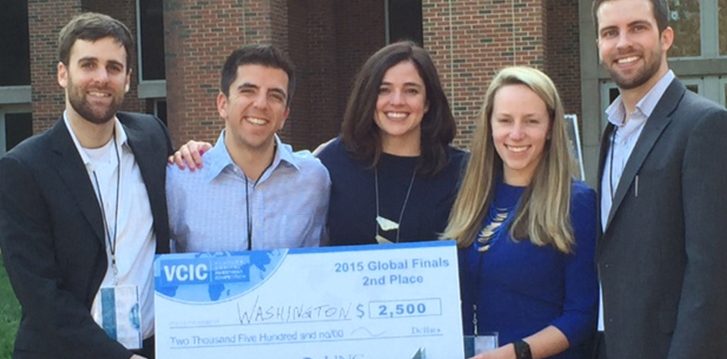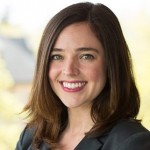Foster Venture Fellows Co-Founder Hartley Riedner on Networking and Building A Sustainable Program
I wrote earlier about the founding of the Foster Venture Fellows, which was started in 2015 as a professional student organization providing practical venture capital industry experience for Foster MBAs and valuable project work for venture capital firms. The previous article on August 2015 was erroneously titled – it should have been titled ‘How three MBA students are connecting Foster MBAs and the Seattle VC community’ because there was a third co-founder: Hartley Riedner, Class of 2016, and a member of the Foster MBA team that won second place at the 2015 Global Venture Capital and Investment Competition. I apologize for this error and got a chance to talk to Hartley last week to hear more about her experience and how the Venture Fellows went. Read on below! – Nelson Tang, Class of 2016
 Hartley (3rd from left) and the rest of the team with their prize for taking second at the 2015 VCIC Global Finals in Chapel Hill, NC
Hartley (3rd from left) and the rest of the team with their prize for taking second at the 2015 VCIC Global Finals in Chapel Hill, NC
What did you do before the MBA?
Before coming to Seattle, I lived in San Francisco and was working in PR and communications in consumer goods and B2B tech companies before moving in-house to an online media startup, where I was able to see how a startup works on the inside. One of my main drivers for coming to the University of Washington was to explore the funding side of startups, so the Buerk Center of Entrepreneurship, Angel Investing class, and other opportunities like those were really big motivators for me to come to Foster.
What kind of activities at Foster really helped you explore that interest?
I found that when I came to Foster there were things in place like the Venture Capital and Investment Competition (VCIC) class and the Angel Investing class and getting involved with the Buerk Center and the Business Plan Competition and things like that. Outside of those there wasn’t a great way to explore the investment and venture capital side. There were great resources around how to start and grow a company but there weren’t many perspectives from the other side of the table. So, I really had to do a lot of my own networking and identifying the people I wanted to talk with.
How did you find the right people to talk to?
Being on the VCIC team that went to the regionals and nationals really helped a lot because we got a lot of exposure to so many great VC firms in town. I would also chase down speakers after class (literally!) and ask them if I could have coffee with them. That actually got me a lot of interviews.
Everybody talks about having this magic card that you have when you’re an MBA student or any kind of student, where anyone will sit down with you and answer your phone call just to chat. I tried to tease that as much as possible while I still had it.
I sought out people who were in the roles that I wanted to be in eventually. My biggest questions for them were around how they landed their first roles. There’s rarely a straight path to those roles in venture capital firms so I wanted to learn more about what they did before going into VC, what skills they gained, and how a good venture capitalist thinks so that I could start working on those skills.
How did this lead you to start the Foster Venture Fellows?
Ken, Rob, and I recognized that there was this gap in getting access to the Venture Capital community and I was lucky to be on the winning VCIC team. If you’re not on that team, there really wasn’t a lot of ways to get connected with the community. We wanted to start something at Foster that could be an institutionalized path to get that experience. Since the VC community in Seattle is so welcoming compared to other markets, we knew that we could place these students in them and also elevate UW’s status in their eyes.
Once the fellowship got underway, what was the experience like, for you and for the Venture Fellows?
It was a really interesting experience as an MBA student, because I feel like this was a weirdly competitive environment. At this point none of us had internships. We were very intentional about trying to create something that was sustainable and would make it easier for future students to get these opportunities. This meant that we had to accept the fact we weren’t going to take those opportunities for ourselves in order to build the program and pave a way for five very lucky individuals in the next class. It was really interesting to find out how well the VC firms received that. I think it showed them how serious we were about creating this program, and they wanted something that was long lasting and would be here for several years. That was a great takeaway for me: if you share your intentions and bring people along in the early stages of the planning process, they’re really a lot more receptive.
For the fellows, we were really pleasantly surprised with the interest that we had, so we tried to create opportunities for students get involved as much as possible. I think that everyone who participated in the program had a beneficial experience, and got exposure to people they wouldn’t normally have interacted or worked with. We have some great takeaways for next year, like the possibility of longer placements and more structure around the projects. Another great thing with the success of this program is that we’ll be able to bring on additional firms for next year, so we can expand the reach of the Venture Fellows community.
And all 5 of those fellows are continuing on next year?
All of them have a leadership role in the program and I think we’re still navigating how the program is going to change for next year, but one of my goals is to try to get a little more diversity of the fellows. I’d like to see more women, especially. There really isn’t a typical background for people who go into venture capital, so I just want to make it more accessible to everyone…meaning that you don’t have to be interested in finance or have a very specific background.
How has this helped your post-MBA plans?
Venture capital is still 100% on my radar, and I think at this point I’m just trying to be open to the path that I take to get there. The path to VC is not a straight shot, but it can be done. I just picked one of the hardest industries that you can get into! It’s tough because it’s such a small community and there are only so many opportunities…but with the relationships and network I’ve grown through the program, my number one goal is to keep those afterwards and to continue to strengthen them. I feel that I’m coming out of this with a really good network.
About Hartley Riedner
 Prior to the MBA, Hartley Riedner (Full Time Class of 2016) was in marketing, communications, and project management first at a PR firm and later at a business-to-business tech startup in the San Francisco Bay Area. For more about Hartley, find her on LinkedIn here.
Prior to the MBA, Hartley Riedner (Full Time Class of 2016) was in marketing, communications, and project management first at a PR firm and later at a business-to-business tech startup in the San Francisco Bay Area. For more about Hartley, find her on LinkedIn here.
Learn more about the Foster Venture Fellows on their website. For more on startups and Foster entrepreneurship, learn more about the Buerk Center of Entrepreneurship and the Graduate Entrepreneurship program.
